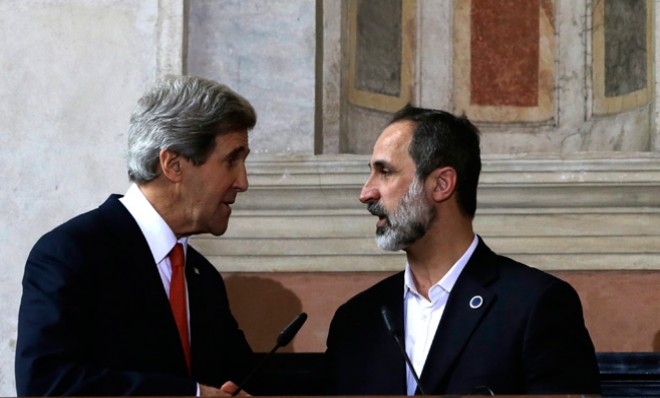Is Obama's aid to Syrian rebels too little, too late?
For the first time, the U.S. is sending aid directly to the opposition. But the money is for food and medicine — not weapons


A free daily email with the biggest news stories of the day – and the best features from TheWeek.com
You are now subscribed
Your newsletter sign-up was successful
Secretary of State John Kerry this week promised $60 million in relief supplies to the Syrian National Coalition, marking the first time the Obama administration has agreed to directly aid the opposition to Syrian President Bashar al-Assad. The money will go to "non-lethal" assistance, such as food and medicine, a fact that left rebel leaders underwhelmed. They had requested weapons, or at least military equipment such as vehicles and night-vision goggles, leaving some Middle East analysts to declare the help "too little, too late."
That's a fair assessment, according to Lee Smith at The Weekly Standard. The opposition knows what it will take to end the bloody, two-year fight to topple Assad, and they're disappointed because they know "the Free Syrian Army is not going to get what it needs" to do the job.
Kerry's press conference in Rome amounts to little more than a tacit admission that finally, after two years, the administration has worked out the bureaucratic kinks. Forget about getting guns to the rebels, the Obama team is just figuring out how to get blankets to Assad's victims inside Syria. [Weekly Standard]
Other observers, though, think President Obama and his team are wise to take this cautious approach. "The administration is right," says The Los Angeles Times in an editorial. "Arming the rebels now would be a mistake."
The Week
Escape your echo chamber. Get the facts behind the news, plus analysis from multiple perspectives.

Sign up for The Week's Free Newsletters
From our morning news briefing to a weekly Good News Newsletter, get the best of The Week delivered directly to your inbox.
From our morning news briefing to a weekly Good News Newsletter, get the best of The Week delivered directly to your inbox.
There is no guarantee that arming the Free Syrian Army would significantly hasten Assad's overthrow, and there remains the possibility that weapons provided to trusted groups would find their way to the radical Islamist fighters who constitute a second front in the opposition to Assad. And while arming the rebels wouldn't lead ineluctably to the use of U.S. air power or the sending of American troops, a military alliance with the rebels would make escalation likelier. [Los Angeles Times]
The trick is finding the right balance between being passive, and getting dragged too deeply into another war, says Greg Dobbs in The Denver Post. "No matter how ugly the war has turned in Syria" — the death toll now stands at an estimated 70,000 — "few if any Americans want to put our soldiers' boots on the ground there." There's still more we can do, though, that would be even more decisive than sending the rebels weapons. "It's called air power."
If Assad wins, it won't matter that we flew in to defeat him; in his mind, we already are the devil incarnate. But if the rebels win, it will matter a lot that the U.S. finally took decisive action, albeit late, on their behalf. We will be the superpower that helped save their revolution, and save their lives. [Denver Post]
A free daily email with the biggest news stories of the day – and the best features from TheWeek.com
Harold Maass is a contributing editor at The Week. He has been writing for The Week since the 2001 debut of the U.S. print edition and served as editor of TheWeek.com when it launched in 2008. Harold started his career as a newspaper reporter in South Florida and Haiti. He has previously worked for a variety of news outlets, including The Miami Herald, ABC News and Fox News, and for several years wrote a daily roundup of financial news for The Week and Yahoo Finance.
-
 The mystery of flight MH370
The mystery of flight MH370The Explainer In 2014, the passenger plane vanished without trace. Twelve years on, a new operation is under way to find the wreckage of the doomed airliner
-
 5 royally funny cartoons about the former prince Andrew’s arrest
5 royally funny cartoons about the former prince Andrew’s arrestCartoons Artists take on falling from grace, kingly manners, and more
-
 The identical twins derailing a French murder trial
The identical twins derailing a French murder trialUnder The Radar Police are unable to tell which suspect’s DNA is on the weapon
